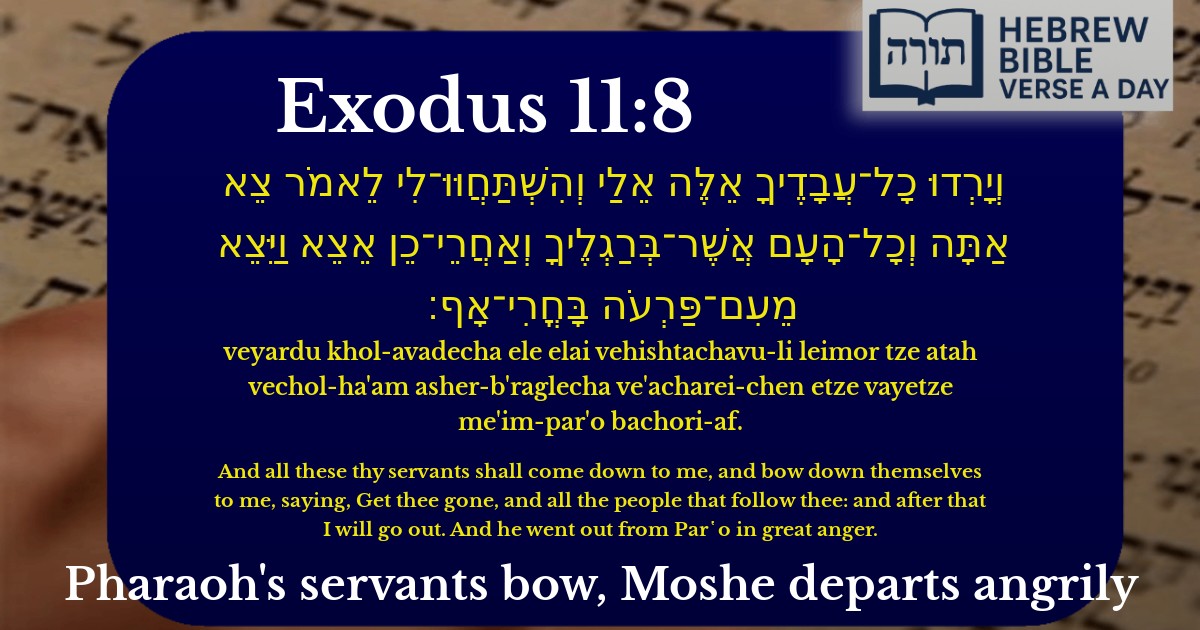Join Our Newsletter To Be Informed When New Videos Are Posted
Join the thousands of fellow Studends who rely on our videos to learn how to read the bible in Hebrew for free!
Hebrew Text
וְיָרְדוּ כָל־עֲבָדֶיךָ אֵלֶּה אֵלַי וְהִשְׁתַּחֲוּוּ־לִי לֵאמֹר צֵא אַתָּה וְכָל־הָעָם אֲשֶׁר־בְּרַגְלֶיךָ וְאַחֲרֵי־כֵן אֵצֵא וַיֵּצֵא מֵעִם־פַּרְעֹה בָּחֳרִי־אָף׃
English Translation
And all these thy servants shall come down to me, and bow down themselves to me, saying, Get thee gone, and all the people that follow thee: and after that I will go out. And he went out from Par῾o in great anger.
Transliteration
Veyardu khol-avadecha ele elai vehishtachavu-li leimor tze atah vechol-ha'am asher-b'raglecha ve'acharei-chen etze vayetze me'im-par'o bachori-af.
Hebrew Leining Text
וְיָרְד֣וּ כׇל־עֲבָדֶ֩יךָ֩ אֵ֨לֶּה אֵלַ֜י וְהִשְׁתַּֽחֲווּ־לִ֣י לֵאמֹ֗ר צֵ֤א אַתָּה֙ וְכׇל־הָעָ֣ם אֲשֶׁר־בְּרַגְלֶ֔יךָ וְאַחֲרֵי־כֵ֖ן אֵצֵ֑א וַיֵּצֵ֥א מֵֽעִם־פַּרְעֹ֖ה בׇּחֳרִי־אָֽף׃ <span class="mam-spi-samekh">{ס}</span>
וְיָרְד֣וּ כׇל־עֲבָדֶ֩יךָ֩ אֵ֨לֶּה אֵלַ֜י וְהִשְׁתַּֽחֲווּ־לִ֣י לֵאמֹ֗ר צֵ֤א אַתָּה֙ וְכׇל־הָעָ֣ם אֲשֶׁר־בְּרַגְלֶ֔יךָ וְאַחֲרֵי־כֵ֖ן אֵצֵ֑א וַיֵּצֵ֥א מֵֽעִם־פַּרְעֹ֖ה בׇּחֳרִי־אָֽף׃ {ס}
🎵 Listen to leining
Parasha Commentary
📚 Talmud Citations
This verse is not quoted in the Talmud.


Context of the Verse
This verse (Shemot 11:8) appears during the final confrontation between Moshe and Pharaoh before the Exodus. Moshe warns Pharaoh of the impending death of the firstborn and declares that Pharaoh's servants will ultimately bow before him, pleading for Bnei Yisrael to leave Egypt.
Rashi's Explanation
Rashi comments that the phrase "וְיָרְדוּ כָל־עֲבָדֶיךָ אֵלֶּה אֵלַי" ("all these thy servants shall come down to me") refers to Pharaoh's high-ranking officials who previously mocked Moshe (as seen in Shemot 10:7). Rashi emphasizes that their descent to Moshe signifies a complete reversal of power—those who once scorned him will now humble themselves before him.
Moshe's Anger
The verse concludes with Moshe leaving Pharaoh "בָּחֳרִי־אָף" ("in great anger"). Ramban explains that Moshe's anger stemmed from Pharaoh's stubborn refusal to heed the warnings, despite witnessing the previous nine plagues. This anger also reflects Moshe's frustration at Pharaoh's continued enslavement of Bnei Yisrael.
Midrashic Insights
Halachic Implications
The Rambam (Hilchot De'ot 2:3) derives from Moshe's controlled anger that righteous indignation is permitted when standing up for truth and justice. However, he cautions that anger must be measured and purposeful, as Moshe demonstrated here—directed only at Pharaoh's obstinacy, not at Bnei Yisrael.